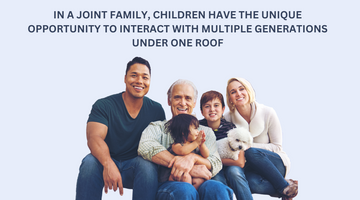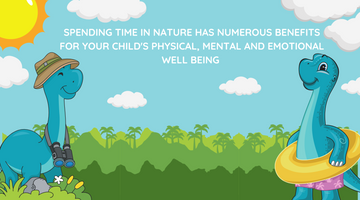Growing up in a joint family can be a remarkable experience filled with love, laughter, and a sense of togetherness. In today's world, where nuclear families have become more common, joint families still hold a special place. From learning valuable life lessons to developing strong bonds with family members, the benefits of growing up in a joint family are truly invaluable.
1. A Supportive Network : One of the most significant benefits of growing up in a joint family is the built-in support system it provides. In a joint family, there are always family members available to lend a helping hand, offer guidance, and provide emotional support. Whether it's dealing with school stress, personal challenges, or simply needing someone to talk to, children in a joint family can count on the unwavering support of their family members. This strong support network helps children develop resilience and navigate life's ups and downs with confidence.
2. Learning from Different Generations : In a joint family, children have the unique opportunity to interact with multiple generations under one roof. They can learn from the wisdom and experience of their grandparents, parents, aunts, and uncles. The diverse knowledge, perspectives, and life stories shared by family members help children broaden their horizons, develop a better understanding of the world, and gain valuable insights. Whether it's learning about history, cultural traditions, or practical skills, the presence of different generations fosters a rich learning environment that goes beyond what can be taught in textbooks.
Checkout our blog - Importance of Social and And Emotional Development in Early Childhood for Kids
3. Stronger Bonds and Social Skills : Growing up in a joint family allows children to develop strong bonds with their siblings, cousins, and extended family members. The constant companionship and shared experiences create a deep sense of belonging and connection. Children in joint families learn important social skills such as sharing, compromising, and resolving conflicts at an early age. They develop empathy, respect for others, and the ability to build meaningful relationships. These social skills become a solid foundation for their future interactions with peers and in professional settings.
4. Cultural and Traditional Heritage : Joint families often have a strong sense of cultural and traditional values. Children growing up in such families are immersed in the richness of their cultural heritage. They witness and actively participate in festivals, rituals, and traditions, which help them understand and appreciate their cultural roots. This exposure fosters a sense of identity, pride, and respect for their heritage. It also enables them to pass down these traditions to future generations, ensuring the preservation of cultural values.
5. Shared Responsibilities and Teamwork : In a joint family, children learn the importance of shared responsibilities and teamwork. They witness how family members work together to manage household chores, financial matters, and other tasks. Children are encouraged to contribute according to their abilities, whether it's helping with cooking, cleaning, or taking care of younger siblings. This shared responsibility fosters a sense of accountability, cooperation, and the ability to work collaboratively as a team. These qualities are essential for success in personal and professional life, and children in joint families acquire them naturally through their daily interactions.
Growing up in a joint family offers numerous advantages that shape children into well-rounded individuals. The support network, diverse learning opportunities, strong bonds, cultural heritage, and shared responsibilities are just a few of the many benefits. Joint families provide a nurturing and enriching environment that helps children develop important life skills, build character, and create lasting memories. While the world around us changes rapidly, the timeless values and advantages of growing up in a joint family continue to play a vital






